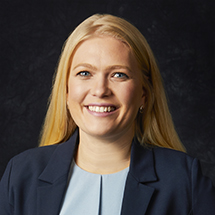Kayla Fourie
Kayla Fourie
Why did you decide to start your legal career at Ropes & Gray?
The London office was only a few years old when I applied for a training contract, which created a dynamic, start-up feel, despite the fact that the firm as a whole is over 150 years old and therefore has many longstanding clients and a stellar global reputation. I realised I’d be exposed to high-quality, varied and exciting work. I was also struck by how international the employees at the firm are and how young the partnership is, relative to many other firms. I chose to qualify here, as I felt, and continue to feel, that Ropes & Gray is a firm that trusts its associates, allows them to take ownership over matters and build trusted relationships with clients.
How has Ropes & Gray helped you build a career as a lawyer?
At Ropes & Gray, I have sat in the asset management, private equity, antitrust and finance teams. As an associate in the asset management team, I am constantly learning new things, from both a commercial and legal perspective, and also from a team and client interaction perspective. Asset management is a practice area that offers the unique combination of being transactional (acting for GPs, LPs and large asset managers more generally), but still quite legal.
Tell us about a memorable matter you’ve worked on.
The first GP mandate that I was put on was the most memorable—it helped me build the foundation upon which most of my subsequent experience has been based, and also gave me the confidence to seek out answers to client and partner questions, draft fund documents and provide analysis in investor negotiations. This transaction also made clear the value of solid client relationships and the level of trust that clients have in us.
Tell us about a pro bono matter you’ve worked on.
I helped produce training materials on the laws concerning sexual and gender-based violence and evidence-gathering in a Sub-Saharan African country. The training was a partnership between our firm and Lawyers Without Borders. I was surprised to see that many of the skills I have acquired in distinct areas of law can be transferable to other areas. It was also incredibly rewarding to be able to assist people who do not have access to the same resources that we do, and to have a real impact on the successful implementation of the rule of law.
The firm is non-hierarchical and adopts an open-door policy. It is also very collaborative, whether that is within teams, between departments or amongst our various offices.”
How would you describe the firm’s culture?
The firm is non-hierarchical and adopts an open-door policy. It is also very collaborative, whether that is within teams, across departments or amongst our various offices. Most of our clients are international, and so their deals and dilemmas are multijurisdictional and require input from many departments. This means that people get to know their colleagues very well at Ropes & Gray, which is particularly great when you are a junior associate and need to reach out with specific queries.
What tips would you give a potential applicant?
In order to stand out (and ensure a good fit with the firm), be yourself. Also, when answering questions in an application or at an interview, always give examples of “how” or “why.” Anyone can say that they are a good team player or have commercial awareness; it is how you back these statements up that is most important.
